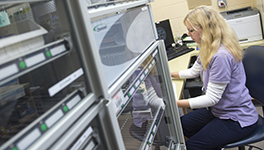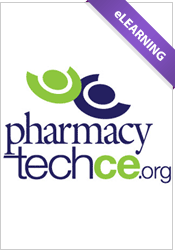Education and Training
There are various ways to obtain education and training to become a pharmacy technician. Completion of formal and standardized training and education program, on-the-job training, and online courses are some of the education and training offerings available to those pursuing a career as a pharmacy technician. Although most pharmacy technicians receive informal on-the-job training, when available, pharmacy employers favor those who have completed a formal and standardized training program and certification.
On-the-job training generally ranges between 3 and 12 months.
Formal technician education programs are available through a variety of organizations, including community colleges, vocational schools, hospitals, and the military. These programs range from 6 months to 2 years and include classroom and laboratory work. They cover a variety of subject areas, such as medical and pharmaceutical terminology, pharmaceutical calculations, pharmacy record-keeping, pharmaceutical techniques, and pharmacy law and ethics. Technicians also are required to learn the names, actions, uses, and doses of the medications they work with. Many training programs include internships, in which students gain hands-on experience in actual pharmacies. After completion, students receive a diploma, a certificate, or an associate's degree, depending on the program.
Over 250 of the formal technician training programs are ASHP/ACPE accredited. ASHP/ACPE accredited programs follow nationally recognized standards and regulations. Employers in any state are aware of the training and education that is provided in an ASHP/ACPE accredited program. ASHP/ACPE accredited programs are at least 400 hours in duration with didactic (classroom or online), work experiences in an actual pharmacy, and laboratory components. ASHP has a directory of all of the ASHP/ACPE accredited education and training programs.
Online Training Courses
There are many programs advertised on television, in magazines, or online that claim you can become a pharmacy technician simply by reading their programs and taking tests. To become a competent pharmacy technician requires both knowledge (which may be obtained online) and skills that must be developed through hands-on experience. ASHP/ACPE-accredited programs involve a combination of classroom instruction and working experiences in an actual pharmacy.
Distance Learning
Distance learning is becoming a popular way to gain education and training to become a pharmacy technician. Some distance learning programs are a combination of both live, online, and online interactive experience. Many programs are very sophisticated and provide online interactive laboratory experiences, as well as the opportunities for work experiences in an actual pharmacy. These programs are sometimes available from chain pharmacy employers. Several of these programs are ASHP/ACPE accredited.
Certification and Other Qualifications
In most states, pharmacy technicians must be registered with the state board of pharmacy. Eligibility requirements vary, but in some states applicants must possess a high school diploma or its equivalent and pay an application fee.
Most states do not require technicians to be certified, but voluntary certification is available through several private organizations. The Pharmacy Technician Certification Board (PTCB) administers national certification examinations. Certification through such programs may enhance an applicant's prospects for employment and is required by some states and employers. To be eligible for either exam, candidates must have a high school diploma or its equivalent and no felony convictions of any kind. In addition, applicants for the PTCB exam must not have had any drug-related or pharmacy-related convictions, including misdemeanors. Many employers will reimburse the cost of the exams.
Under these programs, technicians must be re-certified every 2 years. Re-certification requires 20 hours of continuing education within the 2-year certification period. Continuing education hours can be earned from several different sources, including colleges, pharmacy associations, and pharmacy technician training programs. Up to 10 hours of continuing education also can be earned on the job under the direct supervision and instruction of a pharmacist.
Good customer service and communication skills are needed because pharmacy technicians interact with patients, coworkers, and healthcare professionals. Basic mathematics, spelling, and reading skills also are important, as technicians must interpret prescription orders and verify drug doses. Technicians also must be precise: details are sometimes a matter of life and death.
Advancement
Advancement opportunities are evolving in large pharmacies and health systems pharmacy technicians with significant training or experience can be promoted to supervisory positions. Some may advance into specialty positions such as chemotherapy technician or nuclear pharmacy technician. Others may move into sales. With a substantial amount of formal training, some technicians go on to become pharmacists.
Find a Training Program
Choosing a technician training program is an important beginning to becoming a technician. When you find a program that appeals to you, check out its website. Visit. Ask questions. If possible, talk to graduates. Ask about financial aid, jobs, and the experience of current students.
ASHP has a directory of accredited pharmacy technician programs.


